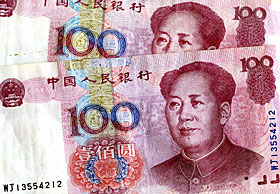PAYMENT
RMB Yuan +++ US Dollar +++ Euro
The currency scenario is clear. What creates volatility and the chance to risk management (Was ist hiermit gemeint?) is the relationship between the Renminbi Yuan of China, the US Dollar and the Euro. During the recent EU China Summit in Nanjing, the EU joined the long-standing US demand that China revaluate the RMB Yuan vs. the US Dollar. The RMB, though bound to the Dollar, was long said to be underevaluated, thus unduly subsidizing China’s exports and aggreviating the trade imbalance with the US. Contrary to the expectations behind the claim, a recent study by the Asian Development Bank is dampening hopes: 10 % revaluation of the RMB would only reduce the US trade deficit with China by 0.05%, or 0.02% of the US Gross Domestic Product. 20% up would cause no more than 1.2% less trade deficit. Therefore, a revaluation of the RMB would not fix the US trade deficit. What it would do is increase overall production costs in China, slow domestic production, overall growth and especially jack up export prices. Dropping exports would also affect Europe, and numerous export- oriented manufacturing companies in China would find it hard to survive, even if they were not tied to the Dollar to begin with.
On the other hand there is a US home-made financial crisis weighing down the national economy. Dramatically over-indebted public and private households and a striking innovation backlog will delay recovery and hamper successful competition with Europe. Consequently, the national debt with the biggest US creditor, that is China (Fort Knox has been standing in Beijing for many years, rather than in its homeland), won’t be easy to reduce. This even more so as China is finding the debt leverage quite useful at times to work against US protectionism, and retaliate for WTO breach allegations. Europe is also heavily indebted, but not quite as much as the US, and Europe depends far less on China as a creditor. This, among many other reasons, is why the Euro is predicted to gain more and more value compared to the Dollar. If the RMB were to be revaluated, the value increase of the EUR might partly compensate the side effects on Sino-European trade, but on the other hand, European exports to China would be expensive in comparison to US goods.
For everyday decision-making and currency risk management, it is essential to have a correct long-term assessment of currency evaluation and likely global shifts of buying and selling powers. Choosing the right currency for any given operation is important. And the RMB Yuan is becoming a more and more practicable currency option.

Payment Monitoring on Trust
Open Terms need Trust to be safe.
Having been present in China for two decades has given us a reputation of reliability, security and credit rating that encourages a growing number of suppliers in various industries in China to entrust us with their shipping documents, the monitoring and follow-up on payments, and with document release against payment proof. This is a lean arrangement to mutual benefit, because it saves both sides time and money, compared to cumbersome documentary bank transactions.
